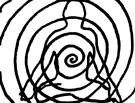

What happens when you die? What’s right and wrong? What’s the purpose of life? Aaaaarrghhh!
Chill out, God has the answers. And the religious part of your brain knows it.
The anterior cingulated cortex is the human home of anxiety. And it’s increasingly chill in people with religious conviction. In fact, this anxiety center is quieter in people with any strong convictions that answer big questions, including conservative political ideologies. (This isn’t necessarily a bad thing: It seems that many people could benefit from a chill pill shoved into their brain’s anxiety center.)
And do you remember the story of Siddhārta Gautama sitting cross-legged beneath the bodhi tree, when his self suddenly merged with the universe? Researchers at the University of Missouri found that this “selfless” religious ecstasy is seen in the brain as reduced activity in the right parietal lobe. Likewise, people with damage to this area of the brain—perhaps due to motorcycle accidents or sacred fig whackage—are more likely to experience selfless religious experience.
Because it’s impossible to gather a group of subjects and then prescribe half of them a steady diet of religious conviction, it’s very difficult to separate which is cause and which is effect in these cases: Does religion quiet anxiety centers, or are people with quiet anxiety centers drawn to religion? The same is the case with parietal lobe damage and selfless religious ecstasy: Are people with quiet parietals likely to experience selfless ecstasy, or does this ecstasy quiet the parietal?

The Meditative Mind
fMRI studies show that brain regions responsible for regulating emotion are larger in long-term meditators. Again, does meditation grow your gray matter or are people with overdeveloped emotion regulation centers drawn to meditation?